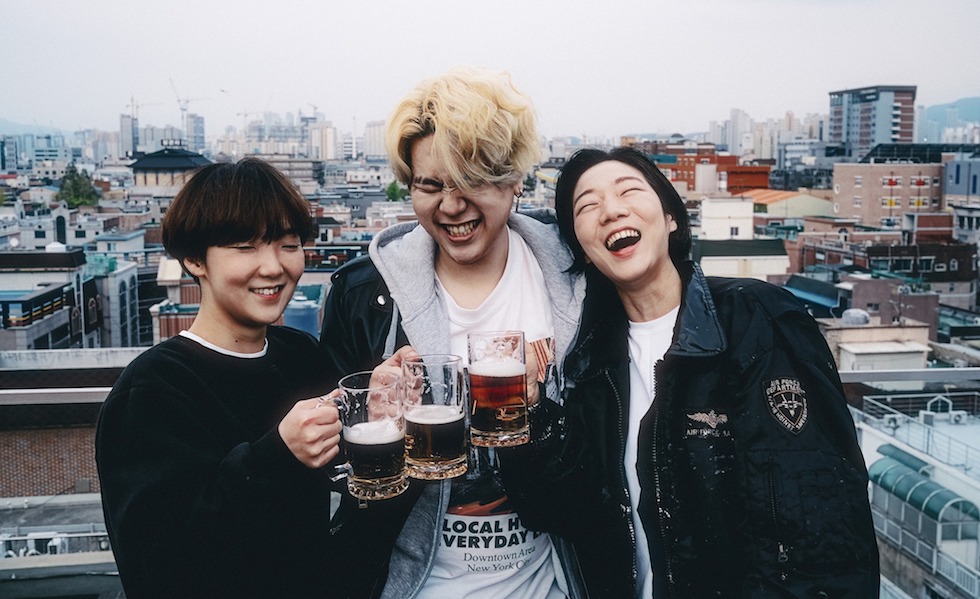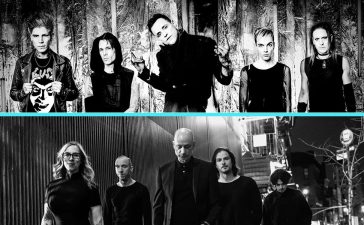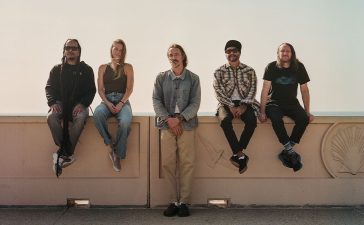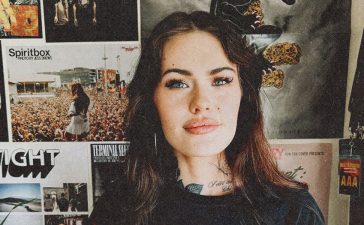Just the mention of the name South Korea is enough to evoke a strong montage in the mind’s eye – even if you haven’t been there. A sweeping metropolis where the pulsing neon cityscape is dappled with the moment of countless millions. K-Pop comes to mind but almost instantly after that so does Kimchi – of which you’ll find more than 250 variations throughout South Korea.
And amongst the urban sprawl, peppered with lush, untouched nature exists a punk scene that never really needed any influence from the west to take flight. But it’s certainly a sound that deserves the attention of The West. To learn more, we spoke with 3-piece punks, Drinking Boys And Girls Choir, hailing from the city of Daegu.
You’ll find two albums from Drinking Boys And Girls Choir – 2018’s Keep Drinking, and 2021’s Marriage Licence. There’s no right place to start, we recommend diving between the two and absolutely losing yourself in the outspoken, yet endearing, punk rock sensibilities.
How did you become a punk?
MJ: I was in a band after the high school graduate test. There were 5 of us. Somehow two of them left. We remaining three were trying to practice some rock star’s song (like Metallica, Finch, Hoobastank and so on) but I was so bad at playing the instruments, so I decided to make songs that we can play. That’s my story how started punk rock. I don’t think so now but at that time simple punk rock seemed easy to me. Of course it is because I’ve been loving punk rock too.
Jung-Hoon: When I was in middle school, I happened to listen to Ellegarden in the car and started to do music because of the song, and then I became interested in rock, so I started to listen to Sum 41, Blink 182 and J-rock in earnest.
Meena: I did punk rock because I wanted to be in a band with MJ, and MJ made punk music. So I get started
Growing up as a young punk in your hometown, what are some of the places you would hang out?
A long time ago, like over 10 years ago, there was a place called Cheonnyang near our rehearsal room. We used to gather there often to eat and drink. Near Myeongdeok Station was Daegu’s indie-rock music Mecca at that time. These days, not really… It’s like we’re just hanging out at my house only for us. It is because the pandemic and disappearing scene.
How would you describe your typical punk from your hometown?
The term “Joseon Punk” was coined as bands such as Crying Nut, No Brain, and Lazybone began to become famous. Their music influenced many punk rockers in Korea. It seems that the most typical/traditional punk band in Korea is a three-to-four band of male members and a band that sings with youth and their loser-ness at the forefront.
Actucally, there is no such as typical “Daegu” punk thesedays.
How does the general community in your hometown take to punks, and punk music?
I’ve never been interested in how other people talk about punk rock here, maybe there is so few people talking about so I’ve never heard. But I hope we can help people in Daegu start talking about punk rock and have a positive impact on the local community.
What do you think is the biggest threat to the punk community in your city?
Unchanging punk rockers themselves. In Korea, the “Me Too” about indie band’s members erupted from a few years ago. Since then, many punk bands have disappeared.
A person identified as a criminal called me and said, “Don’t hate punk, though.” I was speechless. He’s the one who made people hate punk, and I’ve never hated punk. They live like they’re breathless but they still don’t know what they’ve done wrong.
In Korea, when the Queer Culture Festival is held, the Homophobic community, with the church at the front, always holds a very big event on the other side. There is also a punk band that performs at the event and proudly posts pictures on social media. It was a very famous punk band, and I felt frustrated when I saw them.
Nothing is more threatening than the unchanging punkers.
All over the world politics and punk go hand in hand. What are some of the political issues that influence punks in your hometown?
Same here. In last November, several bands in Korea gathered to release a compilation album called “We Do It Together”, which tells the story of feminism. Punk doesn’t mean only music. It is a voice at the forefront of change.
Are there any other locations in the city that are important to it’s punk community?
There are not even live clubs in Daegu. We usually perform at a place called Club Heavy in Daegu.
In Seoul, there were relatively many spaces where punk rockers gathered, but most of them disappeared through gentrification and pandemics. Club Sharp and Sharp Ink, run by members of “Skasucks”, are familiar spaces for us, and GBN and Bender are maintaining their reputation in Seoul.
When I traveled to Osaka, I saw a store that only collected and sold records of punk bands, and I thought it was very cool. Unfortunately, there is no such space in Daegu. Do I need to make one? [Editor note: Yes, do you!]
Who are some great punks, or punk bands making moves from your hometown we can check out? Tell us three.
We can tell only nationwide. Billy Carter, Oh-Chill, Deadbuttons, Ego Function Error, Soumbalgwang (Busan) there are five bands but we love all.
What are your tips for any punks traveling through your hometown?
If you come to Korea, please come to our gig. We do gigs not only in Daegu but also all over the country. Korea is not a big country. It will be easy to find us.






